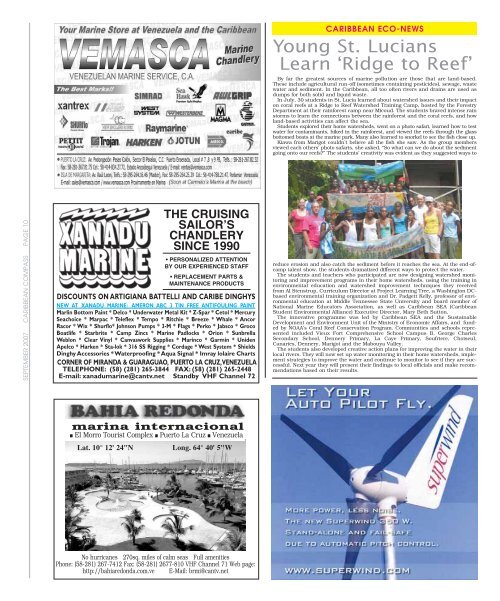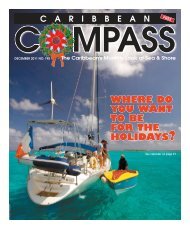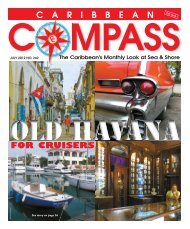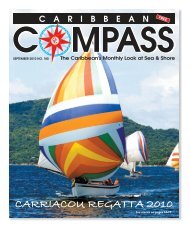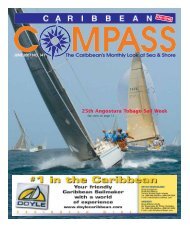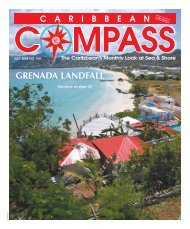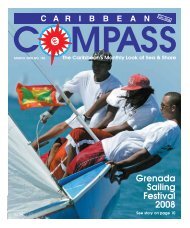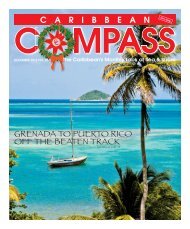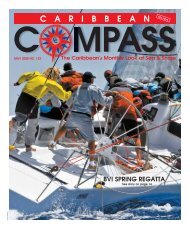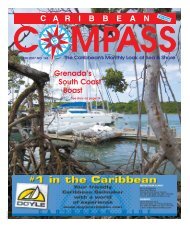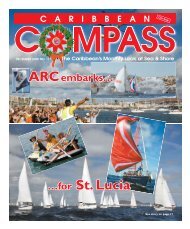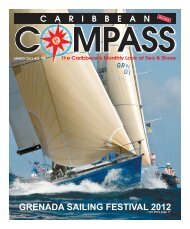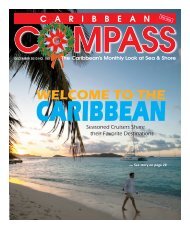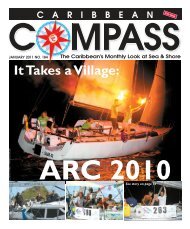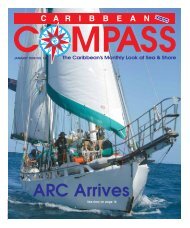Carriacou Regatta Festival 2007 - Caribbean Compass
Carriacou Regatta Festival 2007 - Caribbean Compass
Carriacou Regatta Festival 2007 - Caribbean Compass
You also want an ePaper? Increase the reach of your titles
YUMPU automatically turns print PDFs into web optimized ePapers that Google loves.
SEPTEMBER <strong>2007</strong> CARIBBEAN COMPASS PAGE 10<br />
THE CRUISING<br />
SAILOR’S<br />
CHANDLERY<br />
SINCE 1990<br />
• PERSONALIZED ATTENTION<br />
BY OUR EXPERIENCED STAFF<br />
• REPLACEMENT PARTS &<br />
MAINTENANCE PRODUCTS<br />
DISCOUNTS ON ARTIGIANA BATTELLI AND CARIBE DINGHYS<br />
NEW AT XANADU MARINE: AMERON ABC 3 TIN FREE ANTIFOULING PAINT<br />
Marlin Bottom Paint * Delco * Underwater Metal Kit * Z-Spar * Cetol * Mercury<br />
Seachoice * Marpac * Teleflex * Tempo * Ritchie * Breeze * Whale * Ancor<br />
Racor * Wix * Shurflo* Johnson Pumps * 3-M * Flags * Perko * Jabsco * Groco<br />
Boatlife * Starbrite * Camp Zincs * Marine Padlocks * Orion * Sunbrella<br />
Weblon * Clear Vinyl * Canvaswork Supplies * Marinco * Garmin * Uniden<br />
Apelco * Harken * Sta-lok * 316 SS Rigging * Cordage * West System * Shields<br />
Dinghy Accessories * Waterproofing * Aqua Signal * Imray lolaire Charts<br />
CORNER OF MIRANDA & GUARAGUAO, PUERTO LA CRUZ,VENEZUELA<br />
TELEPHONE: (58) (281) 265-3844 FAX: (58) (281) 265-2448<br />
E-mail: xanadumarine@cantv.net Standby VHF Channel 72<br />
marina internacional<br />
■ El Morro Tourist Complex ■ Puerto La Cruz ■ Venezuela<br />
Lat. 10° 12' 24"N Long. 64° 40' 5"W<br />
No hurricanes 270sq. miles of calm seas Full amenities<br />
Phone: (58-281) 267-7412 Fax: (58-281) 2677-810 VHF Channel 71 Web page:<br />
http://bahiaredonda.com.ve E-Mail: brmi@cantv.net<br />
CARIBBEAN ECO-NEWS<br />
Young St. Lucians<br />
Learn ‘Ridge to Reef’<br />
By far the greatest sources of marine pollution are those that are land-based.<br />
These include agricultural run-off (sometimes containing pesticides), sewage, waste<br />
water and sediment. In the <strong>Caribbean</strong>, all too often rivers and drains are used as<br />
dumps for both solid and liquid waste.<br />
In July, 30 students in St. Lucia learned about watershed issues and their impact<br />
on coral reefs at a Ridge to Reef Watershed Training Camp, hosted by the Forestry<br />
Department at their rainforest camp near Micoud. The students braved intense rain<br />
storms to learn the connections between the rainforest and the coral reefs, and how<br />
land-based activities can affect the sea.<br />
Students explored their home watersheds, went on a photo safari, learned how to test<br />
water for contaminants, hiked in the rainforest, and viewed the reefs through the glass<br />
bottomed boats at the marine park. Many also learned to snorkel to see the fish close up.<br />
Kiawa from Marigot couldn’t believe all the fish she saw. As the group members<br />
viewed each others’ photo safaris, she asked, “So what can we do about the sediment<br />
going onto our reefs?” The students’ creativity was evident as they suggested ways to<br />
reduce erosion and also catch the sediment before it reaches the sea. At the end-ofcamp<br />
talent show, the students dramatized different ways to protect the water.<br />
The students and teachers who participated are now designing watershed monitoring<br />
and improvement programs in their home watersheds, using the training in<br />
environmental education and watershed improvement techniques they received<br />
from Al Stenstrup, Curriculum Director at Project Learning Tree, a Washington DCbased<br />
environmental training organization and Dr. Padgett Kelly, professor of environmental<br />
education at Middle Tennessee State University and board member of<br />
National Marine Educators Association, as well as <strong>Caribbean</strong> SEA (<strong>Caribbean</strong><br />
Student Environmental Alliance) Executive Director, Mary Beth Sutton.<br />
The innovative programme was led by <strong>Caribbean</strong> SEA and the Sustainable<br />
Development and Environment Unit of the Ministry of Economic Affairs, and funded<br />
by NOAA’s Coral Reef Conservation Program. Communities and schools represented<br />
included Vieux Fort Comprehensive School Campus B, George Charles<br />
Secondary School, Dennery Primary, La Caye Primary, Soufriere, Choiseul,<br />
Canaries, Dennery, Marigot and the Mabouya Valley.<br />
The students also developed creative action plans for improving the water in their<br />
local rivers. They will now set up water monitoring in their home watersheds, implement<br />
strategies to improve the water and continue to monitor to see if they are successful.<br />
Next year they will present their findings to local officials and make recommendations<br />
based on their results.


